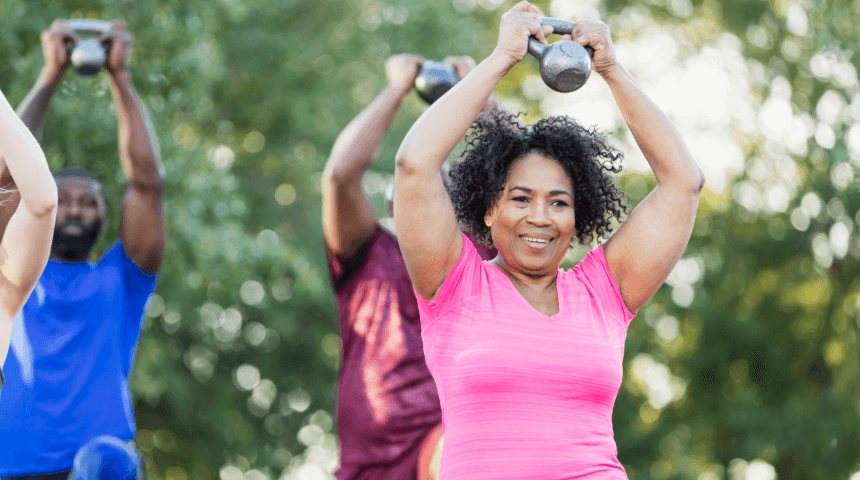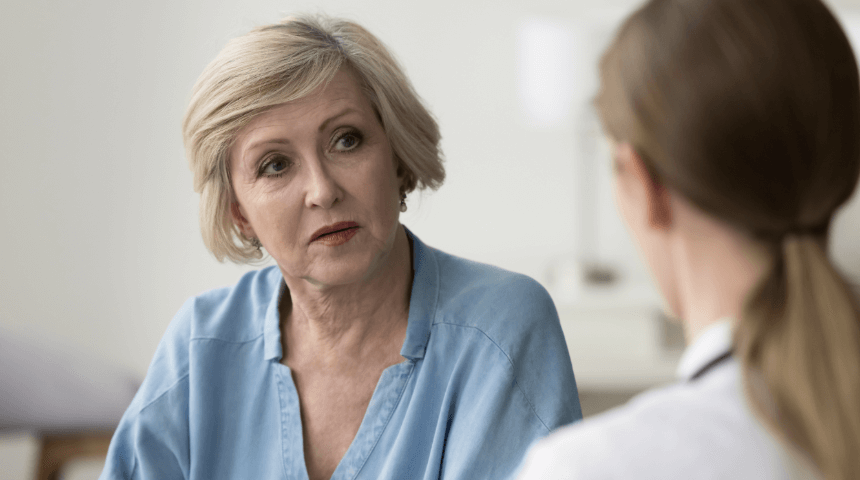If your bones break when other people would merely bruise, or you’re from a family of women with osteoporosis, you should take action now to keep your bones strong — even if you’re years away from menopause. In fact, even with no risk factors, you’ll do yourself a favor by making lifestyle choices to keep your frame in tip-top shape.
What Is Osteoporosis?
Osteoporosis refers to weak bones. As we age, our frame loses its heft, often to the point where a view through a microscope will show bones that resemble a honeycomb — in other words, full of holes. Those bones are more brittle than healthy ones, and therefore more likely to fracture upon impact with a hard surface.
A precursor called osteopenia is a warning sign. In that case, your bone mineral density will be too low, but not as low. More than 43 million American adults have osteopenia. If you are one of them, take steps so your condition doesn’t evolve into osteoporosis.
Doctors determine a woman’s bone mineral density by the numbers determined during a specialized non-invasive test often known as a DEXA scan. Younger women are assigned a Z-score. A rating of -2.0 or lower indicates low bone density for age, and if you are breaking bones easily it may indicate osteoporosis. However, DEXA scans are rarely recommended unless you are fracturing or have a high-risk condition such as celiac disease. Since doctors rarely prescribe osteoporosis medications to women who can still bear children, diet and exercise are the main route to keeping bones strong.
From menopause on, you’ll be told a T-score. “0” is ideal for a young adult, so the numbers start there. The number -1 and up indicates healthy bones. From -1 to -2.5 means you have osteopenia and -2.5 or lower means you have osteoporosis. If your bones have an unacceptable level after you’ve completed menopause, your doctor will likely prescribe pills or injections meant to either reverse the damage or keep it from getting worse.
Data related to osteoporosis, its causes and prevention are inconsistent. Still, the information below should aid you in moving toward healthier bones.
What Will Weaken My Bones?
Most women’s bones are at their peak in their 20s and 30s. It’s best to take bone-friendly steps before that time and keep it up forever.
Here’s where your bone health can go wrong.
- Menopause. Starting with perimenopause — the span before you stop menstruating completely — your body will produce less estrogen. Estrogen helps slow down the weakening of bones, so your bone mineral density numbers might start dropping from this period on.
- Alcohol. Those binges in college, and daily evening glasses of chablis in your 40s — more than seven drinks a week can weaken your bones.
- Smoking. Cigarettes and cigars, or even spending time with other people who are smoking, can weaken your structure. Nicotine slows new bone cells from forming, so you won’t replenish as quickly as needed.
How To Keep Your Bones Strong
Once you reach menopause, your doctor will likely send you for a bone density scan. Don’t wait until you’re 65 though, although some medical organizations recommend that age. By 65, many women already have scores less than -2.5. The sooner you know you’re at risk, the sooner you can take action.
Here are tips that will help whether you’re 22 or 92:
- Get enough calcium. The average woman should get enough calcium every day. The goals: 1,300 milligrams a day from 14 to 18 years of age, 1,000 from 20 until perimenopause, 1,200 while pre-menopausal and on through your silver years, or 2,000 in for those with advanced osteoporosis. Keep a food diary to see if you’re reaching that goal from cheese, milk and other dairy products. Fortified nut and oat milks count too. Otherwise, take a calcium citrate supplement (not calcium carbonate, which isn’t absorbed as well and needs to be taken with food). Have one in the morning and another in the evening, because your body will only process up to 500 milligrams at a time.
- Do not let “cardiac calcium” scores guide you. Those tests reveal how much plaque you have in your heart; the results should not affect your decision to take calcium supplements if you need them.
- Have your blood tested. A blood test will reveal how much calcium is in your blood. Read the results wisely though: If you’re not ingesting enough calcium, your body will pull the calcium into your blood stream, leaving your bones without enough.
- Keep tabs on your Vitamin D intake. Vitamin D helps you absorb calcium, so you need enough of that too. But, D is fat-soluble, meaning too much can harm you. Sunny Florida rarely provides enough, especially for those with darker skin. Vitamin D is found in fortified foods including protein powders and bottled waters, so ask a doctor, nutritionist or dietitian to figure out if you need a supplement, and if so how many IU (International Units) it should be.
- Add estrogen. The hormone estrogen can keep bones strong, so taking a low-dose birth control pill containing estrogen might help you, assuming you’re not trying to get pregnant.
- Exercise. Exercise is obviously useful to all women, including for bone health. Still, walking, jogging, weight lifting, even pickleball help you get or stay strong and will improve your balance. Both are crucial. Yet the amount they’ll increase your bone density is minor, about 1 percent.
- Eat enough. If you’re too thin at any age, due to nature or an eating disorder, your bones may suffer. You need to eat sufficient quantities to get the nutrients your body requires.
- Don’t overdo over-the-counter medications. Maybe you quickly pop aheartburn pill when you’re uncomfortable. Some kinds affect bones, so avoid them when you can.
- Be aware of what prescribed meds do. Some medical providers are quick to prescribe steroids for back pain. Those with lupus and other challenges might need steroids regularly. If you’re being treated for diabetes, inflammatory bowel disease,, asthma or thyroid issues, your essential life-saving medications could affect bones. Find out if yours do so you know to take counter-actions.
- Watch your caffeine and soft drink intake. Some studies show that your favorite java or carbonated beverage might weaken bones. When in doubt, only have a little. Then drink water, the yogurt drink kefir or a natural fruit juice instead.
If you’re young and active, it’s hard to imagine becoming an elderly woman confined to a wheelchair from a broken hip. Why not take steps now to keep your bones healthy for life? Exercise, eat well, don’t overdo drinking or smoking, and watch out for unnecessary medications. And have that daily glass of milk, dairy or otherwise.
Choose to Stay in Touch
Sign up to receive the latest health news and trends, wellness & prevention tips, and much more from Orlando Health.
Sign Up





